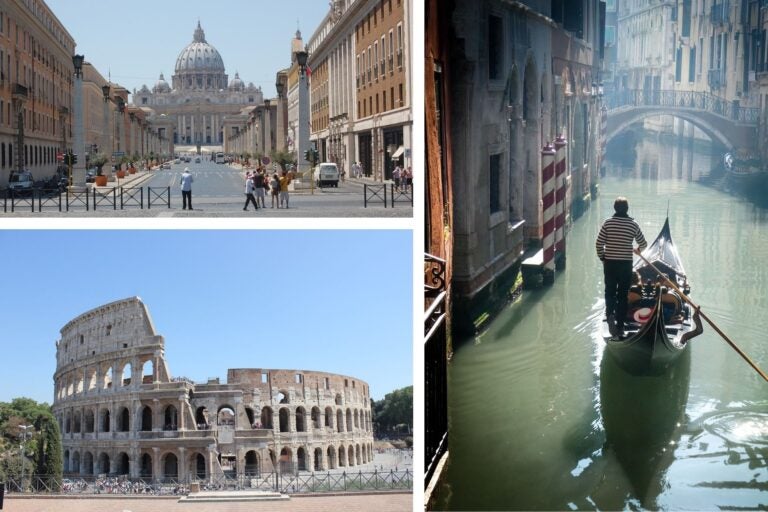Live in Italy: Learn advantages, disadvantages, and costs
Make the step to live in Italy and get to know all the most important aspects about its quality of life, advantages and disadvantages.
Do you want to live in Italy? Strolling through the streets of Rome, taking in its iconic monuments, exploring the Sicilian coast, gliding through Venice on a gondola, or discovering the vineyards of Tuscany. Italy is one of Europe’s most history-rich countries, and spending time there feels like a dream come true.
With its Mediterranean charm and a population of around 58 million, Italy has become a top choice for travelers, remote workers, and students looking to spend some time abroad. In this article, we’ll take a closer look at what life in Italy is really like for foreigners.
We’ll dive into healthcare, education, internet connectivity, safety, and overall quality of life, covering both the perks and the potential downsides. Could Italy be the place you’ve been dreaming of calling home?
Quality of life in Italy
Italy’s rich culture, pleasant climate, and Mediterranean lifestyle all contribute to a high quality of life. If you’re an international student, you’ll want to understand how the education system works and what studying in Italy entails. On the other hand, if you’re a digital nomad, reliable internet will be high on your list. In the sections that follow, we’ll break down all of this and more
Access to the Italian healthcare system
One of the biggest concerns when moving abroad is knowing what to do if you need medical care. Italy has a public healthcare system known as the Servizio Sanitario Nazionale (SSN), which provides universal coverage to both citizens and legal foreign residents. According to the World Health Organization, it’s considered one of the best in Europe, thanks to its broad access and quality of care. Notable public hospitals include Policlinico Gemelli in Rome and Humanitas and San Raffaele Hospital in Milan.
If you’re an EU citizen, make sure to get the European Health Insurance Card (EHIC) before heading to Italy — you can usually apply through your local social security office, either online or in person. If you’re coming from outside the EU but hold a residence permit (permesso di soggiorno), you can also enroll in Italy’s national healthcare system (SSN). Another route, especially popular with students, is private health insurance. In fact, if you’re applying for a scholarship to study in Italy, having health coverage is often one of the requirements.
Safety on the streets of Italy
Safety isn’t something you need to stress about when living in Italy. It’s considered a safe country, ranking 32nd out of 163 nations in the 2024 Global Peace Index. Smaller cities in the north, like Bologna, Trento, and Trieste, tend to have the lowest crime rates. That said, in popular tourist hubs such as Rome, Naples, and Milan, you’ll want to keep an eye out for pickpockets. Local police forces, including the carabinieri, maintain a strong presence to deter petty theft, assist visitors, and manage crowds in busy areas.

Study in Italy
If you’re a student interested in living in Italy to learn Italian or start a university program, you’ll find plenty of opportunities thanks to scholarships offered by the Italian government, along with support from European initiatives like Erasmus+. Italy’s education system is well-organized and internationally respected, especially in fields like fashion, humanities, design, and architecture. According to the QS World University Rankings 2024, some of Italy’s top universities include:
| University | Leading careers | Recognitions |
| University of Bologna (Unibo) | Law, Medicine, Engineering, Political Science. | Considered the oldest university in the world (founded in 1088). |
| Politecnico di Milano | Architecture, Design, Engineering (especially mechanical, electrical and civil). | Recognized as the best technical university in Italy. |
| La Sapienza University of Rome | Economics, Finance, Business Administration, Marketing. | Ranked as one of the world’s leading universities in Humanities and Social Sciences. |

Economy and salaries when living in Italy
Living in Italy can be somewhat pricey, especially in major cities like Milan and Rome, while southern areas like Sicily and Calabria tend to be more affordable. Compared to other European countries such as France or the UK, Italy generally offers a better value. Its economy is largely supported by advanced industries, a strong service sector, and top-quality agriculture. With a GDP of around 2.3 trillion dollars and an unemployment rate close to 7.5%, Italy maintains a solid economic standing.
If you’re moving to Italy and looking to work for a local company, you can expect an average annual salary of about $41,300 before taxes. Your chances of landing a job will depend a lot on your Italian skills, you could find a job in areas like:
- If you master the language: IT, software development, engineering, in the health sector, fashion or in finance.
- If you don’t know Italian: You could work in the hotel industry, agriculture, cleaning, construction or as a teacher of your mother tongue.
Heads up! Whether you’re a foreigner working locally or a digital nomad planning to live in Italy on a nomad visa, it’s crucial to understand the taxes you’ll need to pay to work legally and stay compliant with Italy’s tax system.
Internet connection quality
Italy has really stepped up its digital game recently, with 5G now available across most big cities. Popular carriers like TIM, Vodafone Italia, WindTre, and Fastweb deliver decent internet speeds—about 90 Mbps for home broadband and 65 Mbps on mobile, according to the 2024 Speedtest Global Index.
If you love shopping online, the country has plenty of local platforms with reliable delivery services. Plus, major e-commerce sites like Amazon Italy and eBay.it are widely available, making online shopping easy and convenient.
Looking for reliable, secure 5G coverage anywhere in the country, without interruptions? We recommend Holafly’s monthly plans. They offer the quality you need for remote work, app downloads, and even simultaneous connections on two devices with their unlimited plan for $67.90.
Important: If you are a frequent traveler and want to stay connected without worrying about expensive roaming or looking for a new SIM at every destination, Holafly’s subscription plans are for you. With a single eSIM, enjoy internet in more than 170 countries for a fixed price and no surprises on your bill. Travel without limits and connect easily and securely! 🚀🌍

Advantages of living in Italy
So, what else should you know before you pack up and head to Italy? We’ve talked about the many advantages for foreigners but here are five more perks that could make your decision even easier:
- Cultural heritage: Italy is a country rich in cultural, artistic, and historical heritage. Walking through the streets of Rome, Venice, Florence, or Naples means being surrounded by ancient Roman ruins and stunning Renaissance architecture.
- Renowned gastronomy: You’re lucky enough to savor some of the finest and most iconic foods in the world. Think delicious pasta, authentic pizza, handmade cheeses, and top-notch wines.
- Connections with Europe: From Italy, it’s easy and affordable to travel to other European cities by plane, high-speed train, ferry, or even car.
- Hospitality of the locals: Italians are known for being warm and friendly, so striking up a conversation anywhere in the country comes naturally. Especially in smaller towns and regions, it’s common to be invited to family meals or local gatherings.
- Pleasant climate in the south: The southern Mediterranean coast of Italy offers mild winters and long, sunny summers, making it perfect for beach lovers to enjoy the shore for much of the year. Up north, the Alps attract those who love snowy winters and mountain adventures.

Disadvantages of living in Italy as a foreigner
You might be wondering, is everything really as perfect as it seems? Living in Italy is a unique experience that brings plenty of personal and professional rewards, but it’s also important to be aware of some of the challenges. Here’s what you should know:
- Slow and complex bureaucracy: Administrative processes in Italy can be slow and paperwork-heavy, so things like residency permits, registering for public services, or opening a bank account might take longer than you’d expect. Patience is definitely key.
- Competitive labor market: In certain industries, the job market can be tough for young people, especially in the southern regions where there’s less infrastructure and higher unemployment rates.
- Language barrier: While you can usually get by with English in the bigger cities, picking up some Italian phrases is important if you want to fit in and have access to most job opportunities.
- High taxes: Taxes for freelancers and small businesses in Italy tend to be higher than in many other European countries. If you’re planning to start a business here, it’s important to understand your tax obligations as a foreigner.
Frequently asked questions about living in Italy
If you belong to an EU country, you can reside and work in Italy without a visa, but if your stay is longer than 90 days, you must register your residence in your municipality.
How much you pay for rent really depends on where you live. In big cities like Rome or Milan, you’re looking at around $1,667 a month for an apartment. But if you head to smaller towns or down south, rents can start as low as $555 per month.
If you’re a student, Bologna and Florence offer the liveliest campus scenes, while Milan and Rome are better suited for professionals and entrepreneurs looking for career opportunities.
In Rome we recommend you to stay in Aventino, Prati, Monteverde or Parioli. Meanwhile, the safest neighborhoods in Milan are Brera, Porta Romana, Citylife and Isola.
You don’t always have to have one, but it’s often requested when renting, setting up bills, or receiving your paycheck. It’s definitely worth getting, and there are bank accounts made especially for foreigners.





 Language
Language 


















 No results found
No results found



